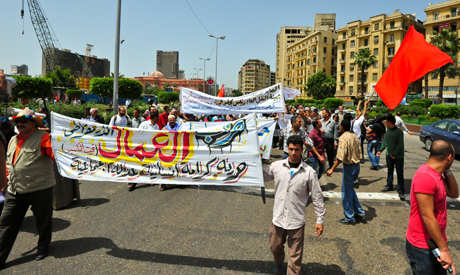Palestine
Israel: Mass protest movement offers hope
300,000 protesters in Tel Aviv, August 6, 2011.
By Guy Gillor
August 8, 2011 – Links International Journal of Socialist Renewal -- The 2011 global uprisings remind us how infectious the revolutionary spirit can be. In the last three weeks, a social movement within Israel has sprung to life in an almost spontaneous manner. A small housing protest that started on July 14 has swept hundreds of thousands of people into protest across the country. As in many other countries, people in Israel face rapidly increasing living costs and privatisation of public assets.
The Oslo mass murder and the mainstreaming of racism in Europe; Solidarity from Palestine

The Sun, a flagship daily of the disgraced Murdoch empire, immediately prepared a front page that described the far-right attack as an "Al Qaeda Massa
Tariq Ali: The Arab intifada and US power (video)
Tariq Ali presents a talk to the British Socialist Workers Party's Marxism 2011, held in
BDS: The global struggle for Palestinian rights (video)
July 21, 2011 – Wearemany.org – Omar Bargho
Western economic attacks against Arab democracy

By Patrick Bond
June 1, 2011-- Rosa Luxemburg Foundation Palestine office, posted at Links International Journal of Socialist Renewal with permission -- In their latest documents and meetings, the G8, the World Bank and the International Monetary Fund (IMF) reacted to the democratic movements in the Arab world: The recipe calls – as it did before the popular ousting of the Tunisian and Egyptian presidents – for privatisation, austerity measures and “market liberation”. Patrick Bond, economic advisor to the new South African government from 1994-2002, analyses the ramifications of the economic campaign on Tunisia, Egypt, Libya and Palestine.
Washington’s seeding of the Arab democratic revolution
Middle East: Can democracy activists undo US and IMF/World Bank damage?
By Patrick Bond, Palestine
May 23, 2011 -- Links International Journal of Socialist Renewal -- Here in Palestine, disgust expressed by civil society reformers about US President Barack Obama’s May 19 policy speech on the Middle East and North Africa confirms that political reconciliation between Washington and fast-rising Arab democrats is impossible.
Amidst many examples, consider the longstanding US tradition of blind, self-destructive support for Israel, which Obama has just amplified. Recognisng a so-called “Jewish state” as a matter of US policy, he introduced a new twist that denies foundational democratic rights for 1.4 million Palestinians living within Israel. For a Harvard-trained constitutional lawyer to sink so low on behalf of Zionist discrimination is shocking.
For although Obama mentioned the “1967 lines” as the basis for two states and thereby appeared to annoy arch-Zionist leader Benjamin Netanyahu, this minimalist United Nations position was amended with a huge caveat: “with land swaps.”
Australia: Greens' BDS stance widens debate over boycott of Israel's apartheid
By Pip Hinman and Peter Boyle
May 18, 2011 -- Links International Journal of Socialist Renewal -- Samah Sabawi, from Australians for Palestine, addressed a May 13, 2011, community forum in Holy Trinity Church Hall, Dulwich Hill, a suburb in Sydney, which was called by local residents to discuss the controversy (incited by Rupert Murdoch's News Ltd media empire) around a December 2010 decision by Marrickville Council to support the global boycott, divestment and sanctions (BDS) campaign against Israel's apartheid. Samah is introduced by Father Dave Smith, the local Anglican parish priest.
Samah Sabawi, part 2
Former Greens parliamentarian Sylvia Hale dissected the NSW Greens' stand in support of BDS and the struggle around the Marrickville Council position.
Documentary: Al Nakba: The Palestinian Catastrophe 1948
Al Nakba: The Palestinian Catastrophe 1948 by Benny Brunner and Alexandra Jansse on Vimeo.
Al Nakba: The Palestinian Catastrophe 1948 (58 minutes, documentary, Israel-Germany-The Netherlands, 1997). Arguably the first film that seriously tackles the historic events that led to the creation of 750,000+ Palestinian refugees at the end of 1948. Based on historian Benny Morris' book, The birth of the Palestinian refugee problem, 1947-49.
Produced and directed for ARTE by Benny Brunner and Alexandra Jansse.
Israel: Histadrut unmoved by Arab winds of change

Members of the Workers Democratic Party march through Tahrir Square on May Day, 2011. Photo by Mohamed El Hebeishy/ahramonline.

South Africans march against Israeli apartheid (image from bdsmovement.net).
By Patrick Bond
A presentation to the Association of American Geographers Annual Meetings, Seattle, Washington, April 12, 2011. Posted at Links International Journal of Socialist Renewal with Patrick Bond’s permission.
This panel is not only devoted to considering arguments about implementing the call for boycott, divestment and sanctions (BDS) against Israel, but also about broader problems of progressive political positioning and backlash in the academy.
